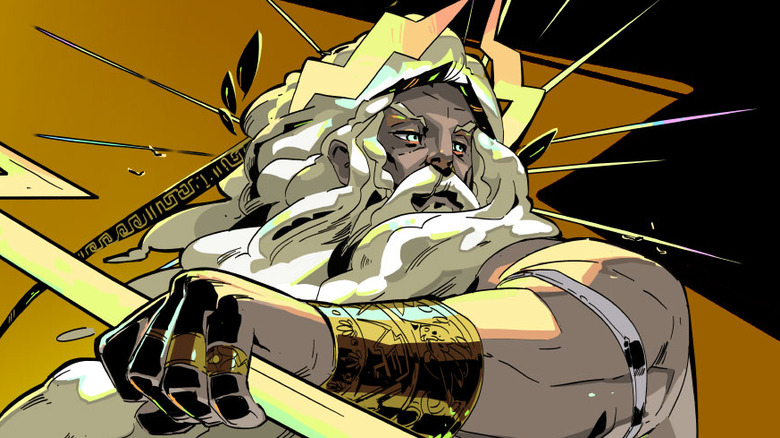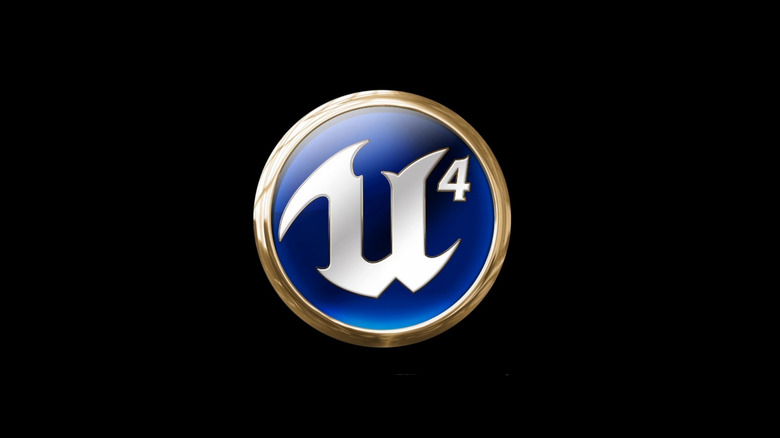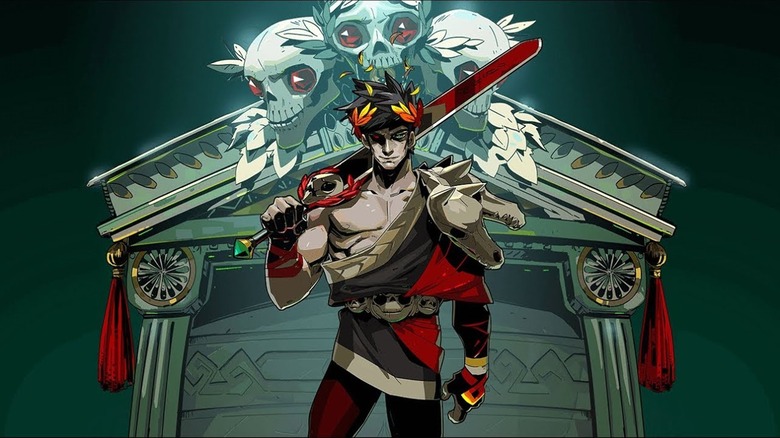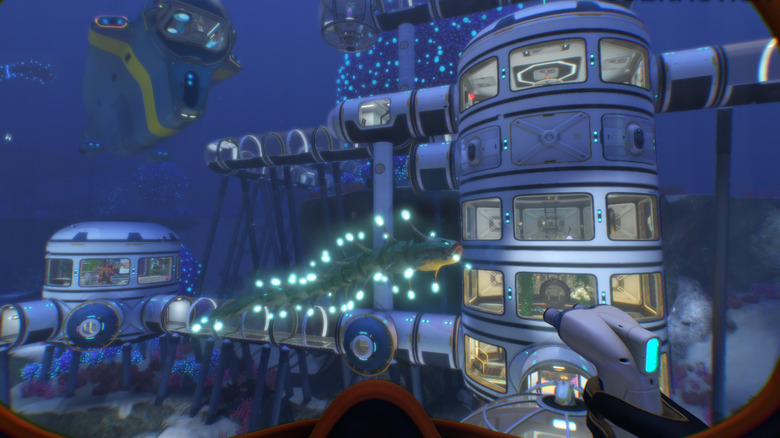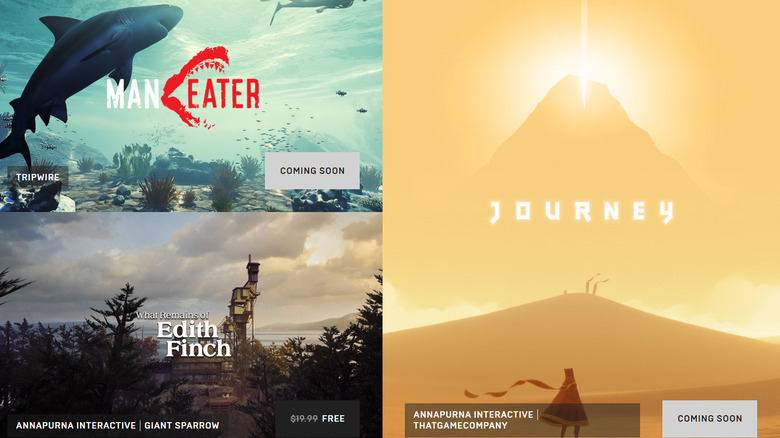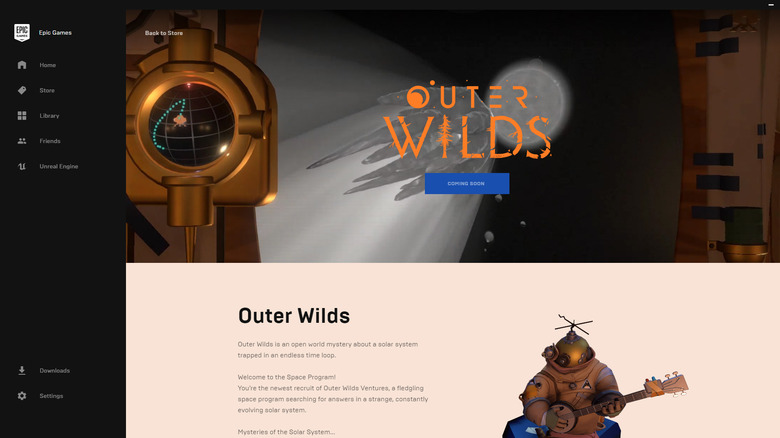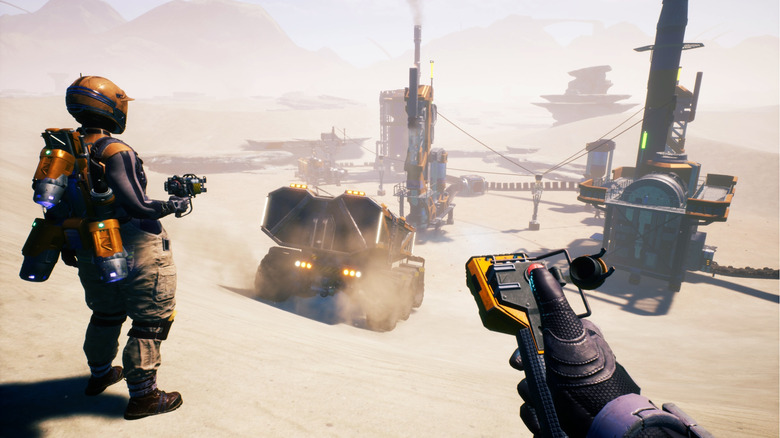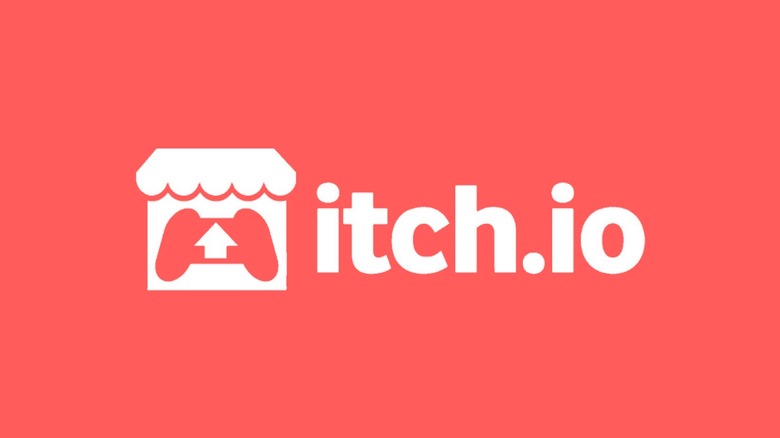Why The Epic Games Store Might Destroy Steam
If you're a serious PC gamer, then you know Steam. There's no way around it. Since its debut back in 2003, Valve Corporation's digital retail platform has grown into the number one place to buy PC games online. With 47 million users who log in per day and $4.3 billion in annual sales, Steam is the very definition of a juggernaut. It's the king of digital distribution in the gaming space, and despite a decade and a half of dominance, there's never been a real threat to Steam's title.
Until now. In December 2018, Epic Games unveiled the Epic Games Store, issuing a real challenge to Steam's throne. With the combined power of the Unreal Engine and a little something called Fortnite behind it, the Epic Games Store is driven by one idea: make developers happy, and the players will follow.
Steam's demise isn't assured. Valve's platform has a user base big enough to weather almost any storm and name recognition to spare. There are signs that the Epic Games Store may not be quite as user- and developer-friendly as it seems, too, but if Epic can leverage its considerable power and stay true to its word, Steam might have a legitimate competitor. That's good for everyone — except for Valve, of course.
Sharing is caring
Here's the Epic Game Stores' biggest pitch to developers: why pay Valve a full 30% of your revenue for doing almost nothing? Game development, especially at the indie level, operates on fairly thin margins. And yet, Valve takes a 30% cut of all sales made through Steam, despite not offering any kind of help with advertising, technical support, or anything else. It's a tax just for showing up. Developers pay it, though. They have to: if they're not on Steam, it's hard for customers to find, buy, and play their games.
The Epic Games Store still charges a commission, but it's a much smaller one. Instead of 30% of every sale, Epic takes 12%. That's it. For roughly a third of what you'd pay to appear on Steam, you can get your game in front of a big audience hungry for new games to play. If you're a struggling developer with no guarantee that you'll break even, which of the two platforms would you choose?
A few days before the Epic Games Store appeared, Valve did lower its revenue share, but it might've actually hurt Steam instead of helping it. Once a game makes over $10 million on Steam, Valve will only take 25% of future sales. After $50 million, that falls to 20%. Since most games don't make anything close to those figures, many saw the policy as a "blatant middle finger" to small and independent developers. Besides, 12% is still less than 20%. That's just math. You can't argue with math.
Big names sell games
Right now, Steam's biggest advantage over Epic is its user base. Millions of people use Steam, and have been for years, meaning that they've already got a sizable library tied to the platform. For developers, that's key. If you want to get your game in front of as many people as possible, you need to put it up on Steam. For better or worse, that's where the players are.
That's why Epic needs exclusive titles to entice people over to its game store, and even more to keep them around. Thankfully, Epic has a big one up its sleeve: Fortnite. Going forward, all Epic games will be exclusive to the Epic Games Store, and that includes the company's industry-dominating battle royale title. In fact, Fortnite on PC launched from the platform that became the Epic Games Store from the beginning. If you're one of the 78.3 million people who play Fortnite every month, you're already an Epic Games Store user.
That's a huge audience for a new platform, and it should get bigger soon. The Division 2, Ubisoft's multiplayer shooter-RPG hybrid, will skip Steam in favor of Epic too. It's not exactly a platform exclusive (you'll also be able to get The Division 2 on Ubisoft's Uplay app) but The Division 2 is one of early 2019's biggest titles, and it should help drive a number of players into Epic's arms — and away from Steam. If that happens, expect the trend to continue. Big time.
Keeping it Unreal
Fortnite isn't the only arrow in Epic's quiver. In addition to games, Epic also makes the Unreal Engine, a collection of tools that developers can build on to make their own titles. If you've played Batman: Arkham Asylum, Final Fantasy 15, Borderlands, or the first three Mass Effect games, then you know what the Unreal Engine is capable of.
The Epic Games Store will be open to games that employ other engines, including Unreal's number one competitor, Unity, but developers who use Unreal have a couple extra incentives to release their games on Epic's platform. One is ease of use. Since Epic controls both Unreal and the Epic Games Store, we'd expect support for the distribution platform to be baked directly into Unreal sooner rather than later. That'd be a huge advantage. Game development is already complicated. The fewer moving pieces to keep track of, the better.
There's a financial reason for Unreal devs to use the Epic Games Store, too. Unreal makes its dough by taking a 5% royalty off of all revenue above $3,000. For Unreal games on the Epic Games Store, Epic is going to waive that fee entirely. Not only will Unreal devs be paying less for distribution on the Epic Games Store than they would on Steam, but they won't have to pay to use the engine at all. That means more cash in the developers' pockets, and makes the Epic Games Store an even more attractive proposition.
Creators hold the power (and the cash)
YouTube videos and Twitch streams can be a great way for game developers to get attention. Five Nights at Freddy's grew into a sprawling multimedia empire thanks to the attention it got from YouTube stars. Without Lirik, a Twitch streamer who played Brendan "PlayerUnknown" Greene's DayZ mod for the better part of three years, we wouldn't have H1Z1, PlayerUnknown's Battlegrounds, and Fortnite (that's what Greene says, anyway).
Epic wants to help developers harness that power. It's already implemented a "Support-a-Creator" program for Fortnite, allowing viewers to donate to streamers they like by spending in-game currency. With the Epic Games Store, the developer wants to let other companies use the program, too. Approved Support-a-Creator affiliates can share links to the games they're playing with their audiences. If anyone uses those links to buy the game, the content creators will get a kickback of at least 5% of the purchase price (the actual rate varies by title).
That's a savvy move, and while there are some concerns — Epic will only cover that 5% for the first two years of the Game Store's lifespan, after which the (optional) bonuses will come out of the developers' bank accounts — some game creators seem to like it. In fact, Supergiant Games claims that it made its newest title, Hades, an Epic Games Store exclusive specifically because of Support-a-Creator, which doesn't have an analogue on Steam. "I want to see streamers and content creators get their dues," Supergiant's Greg Kasavin tells Engadget, "considering how impactful they've become in my own discovery around games." Expect others to follow.
The features that developers want — and none of the ones that they don't
As of this writing, the Epic Games Store is pretty bare-bones. There's a storefront that offers trailers, screenshots, and technical specifications; a friends list; and that's it. But Epic has more features planned for its new platform, and it's trying to focus on the ones that make developers' jobs easier, not harder.
That means that publishers and developers will get analytic data that offers more detailed insights into how their games are performing than what's currently offered on Steam, as well as more complete information about general trends on the platform. It also means that things like reviews will be optional, while social networking features like forums are a non-starter. "Not a single developer I talked to wanted forums," Sergey Galyonkin, the Epic Games employee who ran the Steam-tracking site Steam Spy on the side, tells Kotaku, citing "the toxicity [social networking] brings" as a big problem.
In short, Epic's philosophy seems clear: make developers happy, and they'll bring their games to the Epic Games Store. If all the hottest titles are on Epic, then the fans will be, too. It's a gamble, but if it pays off, Steam could be in big trouble.
A ticket to ride (to real technical support)
You know which feature customers on Steam want more than anything? A way to get in touch with developers for technical support. You know which feature developers want more than anything? The exact same thing. Steam has been around for years, and yet it still has no way for fans to contact publishers when they run into technical problems. That's bad. The work-around is even worse. Without an official support system, users have co-opted Steam's review system to get the job done, leaving negative reviews when something goes wrong. That's the only way to get developers' attention.
As one developer tells Polygon, "I can't tell you how many reviews I've got for issues which have nothing to do with the quality of the game. Forgot my password? Negative review. [Blue screen of death]? Negative review." That's not just a hassle; it hurts developers' bottom lines. If fewer than 70% of a game's reviews are positive, then Steam downgrades the game's ranking from "Positive" to "Mixed." Developers say that that change has an immediate and drastic impact on sales — and, as you can guess, it's not a good one.
And so, when Sergey Galyonkin tells Kotaku that the Epic Games Store will have "a ticketing system, so gamers can message devs about their problems instead of review-bombing them," you can see why that's good news for everyone. Not only will it make life easier for both customers and developers, but it's a sign that Epic is listening to people's complaints and trying to find solutions — something that Valve doesn't appear to be interested in.
The land of the free
All of this is great for developers and publishers, but what does it all mean for the average consumer? Epic has plans for them, too. Obviously, if all of the top-tier developers migrate to Epic's platform the fans will follow, but Epic doesn't want to wait for that to happen. The company is trying to lure players over to the Epic Games Store right now — and it's doing so by giving away a bunch of free stuff.
Every two weeks, the Epic Games Store offers a new game to all users free of charge. Just log in, add the game to your cart, and check out, and it's yours to keep for the foreseeable future. So far, they've been good games, too. Nine years after launch, Super Meat Boy is still the pinnacle of quick-paced tough-as-nails indie platformers. Subnautica's underwater setting puts a unique and welcome spin on tried-and-true survival game mechanics. What Remains of Edith Finch is one of the most innovative narrative adventures of the past few years. And the Jackbox Party Pack is the perfect way to keep your guests entertained all night long.
It's a savvy move by Epic. Not only does the Epic Games Store's rotating selection of free titles ensure that fans will log in every couple of weeks, but these games are tied to their Epic Games Store accounts. If they want to play, they'll need to boot up Epic's launcher — and hey, if they decide to make a purchase or two while they do, so much the better.
A lineup you can trust
Let's face it: there's a lot of crap on Steam. Part of that is a side-effect of volume. When you're launching 180 games every week, chances are that only a few of them are any good. Over the years, Steam became home to countless low-quality cash-ins, shameless knock-offs of more successful titles, and "fake" games designed to exploit Steam's trading card system. All that garbage affects the overall Steam experience. With so much trash to wade through, it can be hard to find the games that are actually worth your hard-earned cash.
Epic wants to solve this problem by offering a higher-quality selection of titles. For the first half of 2019, the Epic Games Store collection will be curated by hand, ensuring that only the very best (or, at the very least, the most interesting) titles make their way onto the storefront. Epic hasn't shared how approvals will work once Epic opens the doors to all developers, but founder Tim Sweeney promises Game Informer that every game on the platform will meet a "reasonable quality threshold."
Epic has to maintain a certain level of quality if it's not going to have reviews turned on by default, but earning consumer's trust will be a big help, too. Buying a game on Steam can be a gamble, especially if it's an obscure or niche title. If Epic can do a better job enticing customers to make impulse buys, that'll mean more cash in its bank account — and less money going to Steam.
All that, and it's easy on the eyes, too!
Great games are worthless if nobody can find them. That's why the Epic Games Store is trying to improve on Steam in another big, consumer-facing area: its user interface. Through his work with Steam Spy, Sergey Galyonkin learned that Steam is plagued by clutter. Usually, you don't only see information about the game that you're interested in. You'll also have to wade through DLC packs, whether or not the game is in a bundle, user-made buying guides related to the games in question, recommendations for similar titles, and more.
All of that stuff can make it hard to find the details you're looking for, which is a disincentive to make a purchase. "There was a problem with too many things competing for users' attention on a game page," Galyonkin says. Clutter isn't only a problem for customers, either. It affects developers, too. With so much information on a page, there's no good place for developers to post news about patches or to share other important information. Everything gets lost in the shuffle.
"That's why we're trying to minimize the store presence on game pages," Galyonkin says, and why Epic wants to keep the Epic Games Store client as lightweight as possible. Without so much other stuff going on, the features that are there — like a developer-specific news feed, for example — will stand out. Knowledge is power, and empowered customers are more likely to make a purchase. That's Epic's plan, at any rate. We'll see if it works.
The exodus has already begun
This isn't all conjecture. There are already signs that Epic's approach is working, even in these early days. Epic hasn't released any sales numbers or user counts, but a number of developers are already committing to making their games Epic Games Store exclusives on PC. You'll probably recognize some of them.
We've already discussed The Division 2 and Hades, but there are many more. Super Meat Boy Forever, the long-awaited follow-up to the genre-defining platformer, will be exclusive to the Epic Games Store for a year, largely because designer Tommy Refenes wants to support a real Steam competitor. Same goes for Rebel Galaxy Outlaw, a blue-collar space sim, and for similar reasons. Ashen, a Dark Souls-like action game published by Annapurna Interactive, was one of the Epic Games Store's big launch titles.
Some developers are going even further and canceling pre-planned Steam releases outright. Radiation Blue's roguelike ship-building title, Genesis Alpha One, might have a Steam page, but a December 2018 news post revealed that it'd be skipping that service (and a planned demo) in order to get the game "off to the best possible start." Coffee Stain Studios, i.e. the people who made Goat Simulator, axed the Steam page for their upcoming factory building title Satisfactory entirely.
It's all about the competition
For all of the reasons to be excited about the Epic Games Store, there are a number of ways it could all go wrong, too. Steam didn't become a success overnight, and now it's so big and so popular that it may be impossible to topple, especially since many of us already have massive game libraries tied to our Steam accounts. The last thing that anyone wants is yet another game launcher to keep track of. Some of Epic's long-term plans, like making developers pay Support-a-Creator fees and relying on influencers to market new games, seem dicey.
Epic isn't the only challenger to the throne, either. GOG's anti-DRM mission statement is more consumer-friendly than anything on Epic's storefront. Humble Bundle doesn't just offer great deals on top-tier games, it also lets customers decide how to split their payment between developers, the Humble store, and their favorite charities. If you're a dev, you won't find a better platform out there than Itchio, which lets developers dictate revenue split (yes, giving Itchio 0% is an option), makes it easy to get your games online for a minimal cost, and gladly welcomes the weird, experimental games that other distributors won't touch.
Ideally, all of those platforms will succeed. In the long run, it's not the specific features that make the Epic Games Store so exciting. It's the idea that, at long last, someone's taking Steam head on. Real competition will force everyone to step up their game — and if that happens, everyone wins, Valve included.

